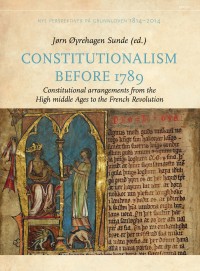Pax Forlag (Oslo) published a collective work under the direction of Prof. J. O. Sunde (Bergen), assembling contributions on constitutionalism in Pre-Revolutionary Europe (link).
Contents:
- "The Constitution of Peace and Liberty in the Catalan Medieval Legal Tradition. An Example of the Interaction between Religious Law and Secular Law in the European Middle Ages" (Prof. Aniceto Masferrer, Valencia)
- "Galbert of Bruges on the Flemish 1127-1128 Crisis - An Early Experiment in Constitutionalism, Parliamentarism and Popular Sovereignty Inspired by Feudal Law" (Prof. Dirk Heirbaut, Gent)
- "Quod Omnes Tangit, Debet Ab Omnibus Approbari" (Prof. Orazio Condorelli, Catania)
- "Propagating Constitutional Reform in the Middle Ages: the Baronial Rebellion" (Prof. Leidulf Melve, Bergen)
- "Whose Constitution? Grass-Roots and Hierarchial Visions of the Late Medieval Church" (Prof. Wolfgang Müller, Fordham)
- "Mixed Constitution in the Scandinavian Realms in the Middle Ages" (Dr. Frode Hervik, Bergen)
- "Induced by the Devil ? Christian I and the Privilegium" (Dr. Biörn Tjällén, Stockholm)
- "Power, Reason and Equity. Two Juristic Accounts of Royal Authority in Sixteenth-Century Scotland" (Dr. Andrew R C Simpson, Aberdeen)
- "On the Development of the Term "Verfassung" from the Plurality of the Ancien Régime's "Leges Fundamentales"" (dr. Heinz Mohnhaupt, emeritus, MPI Frankfurt)
- "Above the Law - Norwegian Constitutionalism and the Code of 1274" (Jorn Oyrehagen Sunde)
The great era of constitutionalism spans from the French revolution of July 1789 to the octroyed French constitution of June 1814. Yet, the European constitutional mechanisms and way of reasoning can be traced much further back. This project displays the need to expand, restrain and at the same time legitimise state power from the 12th century and beyond the great era of constitutionalism in order to demonstrate its historical reach.
The Church was an early example of a state-like and centralised power, and thus contributed greatly to the development of a state organised Europe. This project examines the Church as a driving force behind constitutional reasoning and as a developer of constitutional practice throughout the Middle Ages. Feudal law, with its contractual based system of rights and duties, could regulate society on several levels and thus was another source for constitutional reasoning and practices.
Constitutional reasoning and practices developed in varied places such as the city-states of Flanders, the kingdoms of Norway and England, and the Iberian Peninsula. They continuously influenced state formation and politics in countries such as the Scandinavian kingdoms, as well as being the object of scholarly studies in Scotland, Germany and France. As a result, philosophers of the Enlightenment and the revolutionary movements could draw on a multitude of practices and theories during the 18th century.


No comments:
Post a Comment